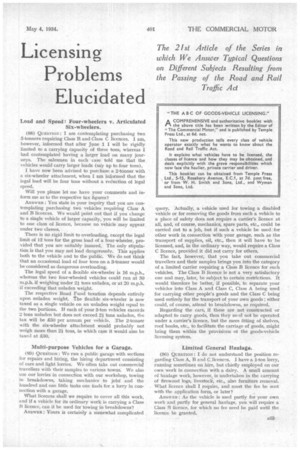Licensing Problems Elucidated
Page 39

If you've noticed an error in this article please click here to report it so we can fix it.
Load and Speed: Four-wheelers v. Articulated Six-wheelers.
(88) QUESTION: I am contemplating purchasing two 3-tonners requiring Class B and Class C licences. I am, however, informed that after June 1 I will be rigidly limited to a carrying capacity of three tons, whereas I had contemplated having a larger load on many journeys. The salesmen in each case told me that the vehicles would carry larger loads (say up to four tons).
I have now been advised to purchase a 2-tonner with a six-wheeler attachment, when I am informed that the legal load will be four tons without a reduction of legal speed.
Will you please let me have your comments and inform me as to the respective tax figures?
ANSWER: You state in your inquiry that you are contemplating purchasing two vehicles requiring Class A and B licences. We would point out that if you change to a single vehicle of larger capacity, you will be limited to one class of licence, because no vehicle may appear under two classes.
There is no rigid limit to overloading, except the legal limit of 12 tons for the gross load of a four-wheeler, provided that you are suitably insured. The only stipulation is that you may not load dangerously. This applies both to the vehicle and to the public. We do not think that an occasional load of four tons on a 3-tonner would be considered as dangerous overloading.
The legal speed of a flexible six-wheeler is 16 m.p.h., whereas the two four-wheeled vehicles could run at 30 m.p.h. if weighing under 21 tons unladen, or at 20 m.p.h. if exceeding that unladen weight.
The respective Road Fund taxation depends entirely upon unladen weight. The flexible six-wheeler is now taxed as a single vehicle on an unladen weight equal to the two portions. If each of your 3-ton vehicles exceeds 2 tons unladen but does not exceed 2i tons unladen, the tax will be £30 per annum per vehicle. The 2-tonner with the six-wheeler attachment would probably not weigh more than 2i tons, in which case it would also he taxed at £30.
Multi-purpose Vehicles for a Garage.
(89) QUESTION We run a public garage with sections for repairs and hiring, the hiring department consisting of cars and light lorries. We often take out commercial travellers with their samples to various towns. We also use our lorries in connection with our workshop, towing in breakdowns, taking mechanics to job g and the hundred and one little tasks one finds for a lorry in connection with a garage.
What licences shall we require to cover all this work, and if a vehicle for its ordinary work is carrying a Class B licence, can it be used for towing in breakdowns?
ANSWER: Yours is certainly a somewhat complicated
query. Actually, a vehicle used for towing a disabled vehicle or for removing the goods from such a vehicle to a place of safety does not require a carrier's licence at all, and, of course, mechanics, spare parts, etc., could be carried out to a job, but if such a vehicle be used for other work in connection with your garage, such as the transport of supplies, oil, etc., then it will have to be licensed, and, in the ordinary way, would require a Class C licence, provided it did not carry for others.
The fact, however, that you take out commercial travellers and their samples brings you into the category of a limited carrier requiring a Class B licence for such vehicles. The Class B licence is not a very satisfactory one and may, later, be subject to certain restrictions. It would therefore be better, if possible, to separate your vehicles into Class A and Class C, Class A being used for carrying other people's goods and the Class C being used entirely for the transport of your own goods ; either could, of course, attend to breakdowns, as required.
Regarding the cars, if these are not constructed or adapted to carry goods, then they ne3d not be operated under a carrier's licence, but the mere fitting of shelves, roof hooks, etc., to facilitate the carriage of goods, might bring them within the provisions ot the goods-vehicle licensing system.
Limited General Haulage.
(0O) QUESTION: I do not understand the position regarding Class A, B and C licences. I have a 1-ton lorry, running sometimes on hire, but chiefly employed on our own work in connection with a dairy. A small amount of haulage work, however, is undertaken in the carrying of firewood logs, livestock, etc., also furniture removal. What licence shall I require, and must the fee be sent with the application form, or later?
ANSWER As the vehicle is used partly for your own work and partly for general haulage, you will require a Class B licence, for which no fee need be paid until the licence be granted.




























































































